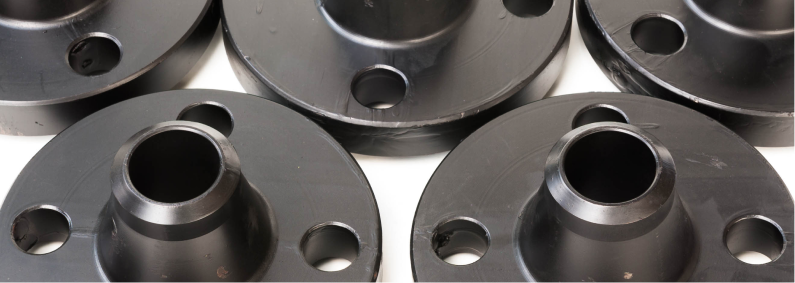Carbon Steel Flanges

Carbon steel flanges are essential components for creating secure connections in piping systems, known for their durability, strength, and ability to withstand high pressures and temperatures. These flanges provide reliable performance in industries such as oil and gas, petrochemical, power generation, and water treatment, where they are used to connect pipes, valves, and other equipment. Our carbon steel flanges are manufactured to meet various industry standards, including ASME, ANSI, DIN, and EN, ensuring safety, compliance, and consistent quality.
We offer a wide selection of carbon steel flanges, including weld neck, slip-on, blind, threaded, and socket weld types, each designed to meet the unique requirements of industrial applications. Our carbon steel flanges are available in multiple pressure ratings and dimensions, making them versatile options for demanding environments.
Key Benefits of Carbon Steel Flanges
- High Strength and Durability: Carbon steel offers excellent strength, making it an ideal material for flanges used in high-pressure and high-temperature applications.
- Cost-Effective Solution: Compared to alloy and stainless steel flanges, carbon steel flanges provide a more affordable solution without compromising performance in moderate environments.
- Corrosion Resistance (with Coatings): Carbon steel can be coated or treated for enhanced corrosion resistance, providing reliable performance in a variety of industrial applications.
- Versatile Applications: Carbon steel flanges are compatible with most piping systems and can be used in applications such as water treatment, oil and gas pipelines, and chemical processing.
- Ease of Fabrication and Machining: Carbon steel is easier to machine and fabricate compared to other metals, allowing for custom shapes and sizes to fit unique piping configurations.
Types of Carbon Steel Flanges
- Weld Neck Flanges: Designed for high-stress applications, weld neck flanges provide a secure, leak-proof connection and are commonly used in oil and gas, chemical processing, and power generation.
- Slip-On Flanges: These cost-effective flanges slip over the pipe and are then welded in place, offering easy installation and suitability for lower-pressure applications.
- Blind Flanges: Used to close the end of a piping system, blind flanges provide a secure seal and allow easy access to the system for maintenance and inspection.
- Threaded Flanges: Ideal for low-pressure applications, threaded flanges are easy to install without welding, making them suitable for connections that may require future disassembly.
- Socket Weld Flanges: These flanges are often used for smaller pipe sizes and are commonly found in high-pressure applications like hydraulic systems.
- Lap Joint Flanges: Used in conjunction with a lap joint stub end, lap joint flanges are beneficial for applications requiring frequent dismantling.
Specifications and Standards
Our carbon steel flanges are manufactured according to various international standards, including:
- ASME B16.5 and ASME B16.47: Standards for flanges in various sizes and pressure classes.
- DIN and EN Standards: Covering European standards for carbon steel flanges, offering compatibility with international piping systems.
- API Standards: API-compliant flanges for use in the oil and gas industry.
Applications of Carbon Steel Flanges
- Oil and Gas Pipelines: Carbon steel flanges are widely used in pipelines, where their strength and resistance to high pressure make them ideal for transporting oil, natural gas, and petroleum products.
- Petrochemical and Chemical Processing: Carbon steel’s ability to withstand high temperatures makes these flanges suitable for chemical processing plants where exposure to various chemicals and pressures is common.
- Power Generation: Carbon steel flanges are essential components in power plants, where they are used in high-pressure steam and cooling systems.
- Water Treatment Facilities: Carbon steel flanges provide durable and leak-proof connections in water treatment and wastewater systems, ensuring a reliable flow of fluids.
- Marine and Offshore Applications: Coated carbon steel flanges are used in marine and offshore environments to resist saltwater corrosion and provide durable connections in harsh conditions.
Customization Options
We offer a range of customization options to meet the specific needs of your project:
- Pressure Ratings: Carbon steel flanges are available in Class 150, 300, 600, 900, 1500, and 2500 to match your system’s pressure requirements.
- Surface Coatings: Options include galvanized, black paint, and anti-corrosive coatings to enhance durability in corrosive environments.
- Dimensions: Custom sizes and thicknesses are available to ensure compatibility with unique piping systems.
- Bolt Hole Patterns: Custom bolt hole patterns for easy installation and secure connections.
Quality Assurance
All our carbon steel flanges are produced with rigorous quality control measures and are tested at every stage of production. We adhere to industry standards, ensuring that each flange meets the required specifications for safety and performance. Upon request, third-party inspections and certificates are available to provide additional assurance of quality and compliance.
FAQs
Carbon steel flanges are known for their high tensile strength and ability to withstand significant pressure and temperature, making them ideal for high-pressure systems in industries such as oil and gas and chemical processing.
Yes, carbon steel flanges can be used in corrosive environments when coated or treated with anti-corrosive finishes like galvanizing, black paint, or custom coatings designed to prevent rust and degradation.
Weld neck flanges are welded to the pipe neck, providing a high-strength, leak-proof seal suitable for high-pressure applications. Slip-on flanges, on the other hand, slide over the pipe and are welded in place, making them easier to install but less suitable for extreme pressure.

Products
Industry We Serve
- Oil & Gas industries
- Chemical process industries
- Pump and valve in high pressure component
- Food industries
- Pulp and paper industry
- Aerospace industry
- Power plant
- Mechanical component
- Sugar industry
- Cement industry
